Assassin's Creed Syndicate PS4 Review: Getting the Gang Back Together
Did Ubisoft learn the right lessons from the poor reception of Assassin's Creed Unity? Let's hit London and find out.
This article first appeared on USgamer, a partner publication of VG247. Some content, such as this article, has been migrated to VG247 for posterity after USgamer's closure - but it has not been edited or further vetted by the VG247 team.
Hello again, my old friend. Let's see how you've changed since the last time I saw you.
It's possible that you may not know what Assassin's Creed is. The brief explanation is that Assassin's Creed is Ubisoft's open-world adventure franchise. Part travelogue, part history book, part action game, part stealth title. The series is concerned with an ongoing endless war between two factions: the Assassin Brotherhood and the Templars. The Assassins want freedom, the Templars want order; neither side is quite sure on how to accomplish those goals, but we play as the Assassins, so they're the good team. Every year we get a new entry in a new period.
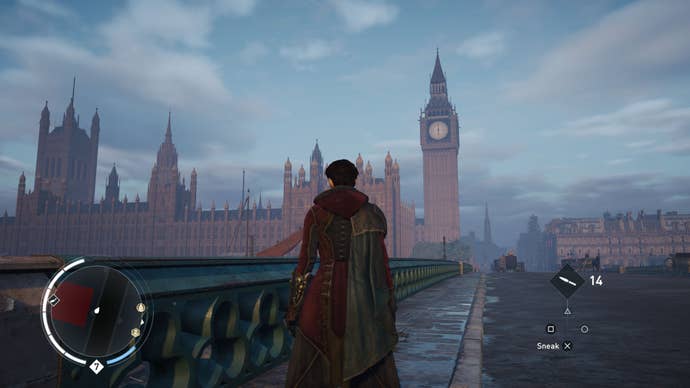
Assassin's Creed: Syndicate shifts the ongoing Assassin and Templar war to London, England in 1868. This puts the game's setting in the midst of the Second Industrial Revolution in one of the largest and most progressive cities of the era. Improved metalworking and textile manufacturing, steam power, and the general increase the factory system; it all happened in one place. The city of London was the bustling heart of civilization, a showcase of its best and worst: great affluence and intense poverty.
His(and Her)story
Into this crucible Syndicate throws the Evie and Jacob, the Frye twins. This is actually a first for Assassin's Creed, with Syndicate splitting the story between both characters. When you're out and about in the open-world, you can switch between them freely. They both play exactly the same, using the same weapons with slightly different clothing options. (I was pleasantly surprised to find out that Evie can still participate in the Fight Clubs that dot the city. With the shirtless men boxing, I figured it'd be Jacob only, but Evie is just as capable.)
Their skill trees are mostly the same, with a few holdover skills at the end of each tree to differentiate between brother and sister. If you're not in a story mission, you can pretty much play whoever strikes your fancy. I personally spent most of my time playing Evie, since I felt the character fits the Assassin's Creed concept more.
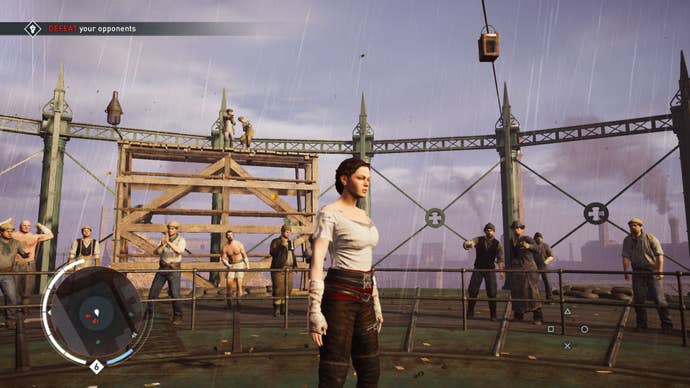
When the twins hit London, they each do so for different reasons. Evie is the quintessential assassin, who took her father's teachings seriously and strives to be the silent knife in the shadows. She wants to prevent London's Templar Order from taking control of the Shroud of Eden, one of the many artifacts from the First Civilization that holds impressive (if undefined for most of the game) powers.
Jacob on the other hand is impulsive and reckless. He's an assassin in name only. He does what he feels is right and his drive in London is to kill the Seven Deadly Generals (my title, not Ubisoft's) of Templar Grand Master Crawford Starrick. If he gains control of the city at the same time, even better. To that end, Jacob establishes the Rooks, a gang that lends the game its "Syndicate" moniker.
When I first heard that I'd be forced to play Jacob or Evie in story missions, I was disappointed. In practice, it makes perfect sense. They don't mix. Jacob goes off half-cocked and Evie is all about the planning. One of Evie's missions actually involves fixing issues that Jacob caused in his preceding story mission. They clash and fight. Jacob doesn't care about the Shroud of Eden and Evie thinks focusing on murdering Templars isn't the right way. They are family and you shouldn't be around family too much.
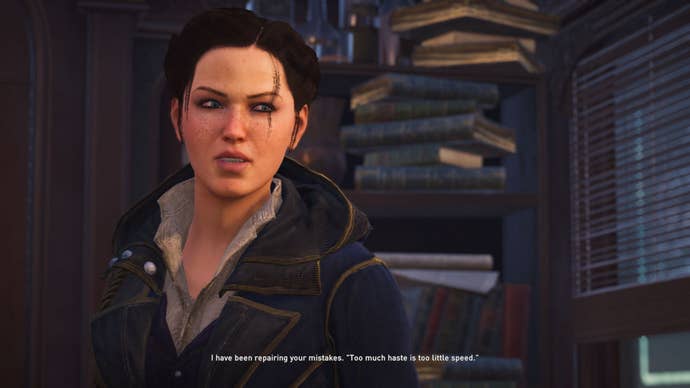
Sadly, the execution of the tandem story doesn't comes across quite as well as it could. Jacob is still the nominal lead. For most of the early sequences, they each get 2-3 story missions each, but that eventually gives way to Jacob taking over for the entirety of a latter sequence. It makes sense, as Evie's only real failing is trusting her brother to stay out of trouble, while Jacob needs to realize that you need to think and plan occasionally. Still I think Evie could've used a little more love as the game's plot speeds towards its ending. It's not the best Assassin's Creed tale, but the dichotomy helps the telling.
If you're an AC fan and you're wondering about the modern day side of the story, there's not much to say. It's still around, but it's played as pre-rendered drone footage following Shaun, Rebecca, and other AC extended universe characters. The player is just "The Initiate", like Unity. For some, this may be like choking down a chicken bone. I was never too excited about wandering around in the modern day, hacking computers or hopping around ruins. Even the best Desmond stuff was just a lukewarm version of the real game. Now the game can focus on what matters: stabbing people back in the day.
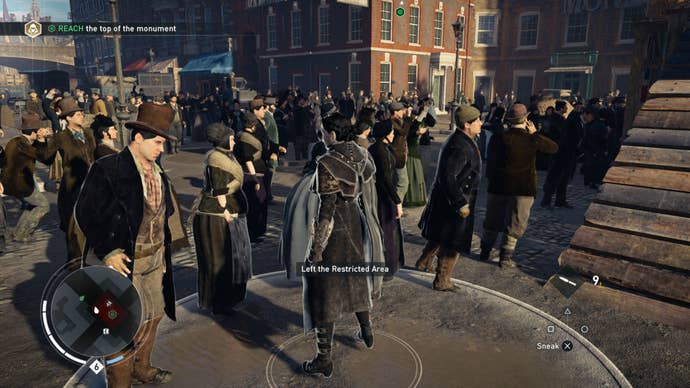
Running Time
How does the game run? Smoother than last year's version of Assassin's Creed. Is it locked at 30 fps? No, but it does tend to stay there more often than its predecessor. The trade-off is that while Syndicate is still a damn good-looking game, Unity outdoes it here and there. It seems as if Ubisoft had to choose between performance and fidelity; the reception to Unity's performance means Syndicate was tuned in a different direction. Oddly enough, I feel like this same performance-vs-graphics trade-off has happened before, moving from Assassin's Creed to Assassin's Creed II and Assassin's Creed III to Assassin's Creed IV (on the same platform).
The Play's the Thing
If you were expecting a revolution in gameplay to go along with the setting, you'll be disappointed. The core game is still another iteration on everything that Ubisoft has built up until now. The Parkour Up and Down system from Assassin's Creed Unity returns here largely unchanged. (An interesting side effect of the updated Parkour system is that you can no longer leap of a roof to your death, even if you want to. You simply won't jump in Parkour Up and Parkour Down gets you down safely.)
Stealth has shifted for the better. Unity used a button to attach you to cover, but Syndicate moves back to a soft cover system. Lean towards a wall and you'll stick to it. It's not as precise as the cover button, but it works.
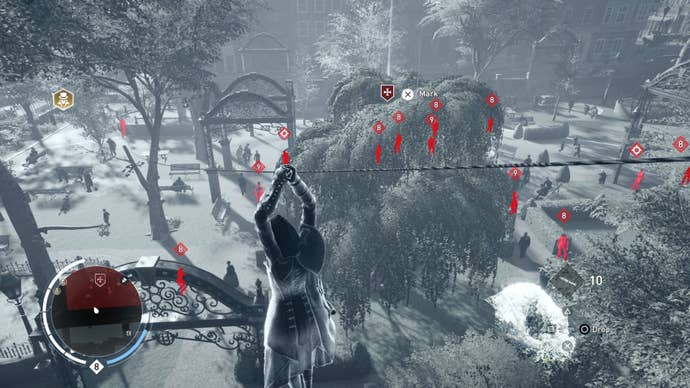
The better additions are some stealth options: whistling and body carrying are back, the throwing knife now makes an audible sound for distraction purposes, there's more environmental traps to utilize against your foes, and the new stealth ring keeps you apprised of who's eyeing you. The latter addition is very useful, especially is an enemy is off-camera, but I know some players will wish you could turn it off.
Sadly, the AI still isn't up to the task of making you really need to use all those options. The old Assassin's Creed run-and-gun is a bit harder - enemies who hit alert mode automatically snap you into combat mode, instead of giving you more time in assassin stabbing time - but it's still very possible.
Metal Gear Solid V: The Phantom Pain featured more robust stealth gameplay, but I don't think you'll see that in Assassin's Creed anytime soon. That's Splinter Cell's stock and trade, assuming Ubisoft keeps that series moving forward. Assassin's Creed is easier and it tends to give you way more chances to fail and recover. That's what the series is and I think anyone hunting for harder stealth might be better served with other titles.
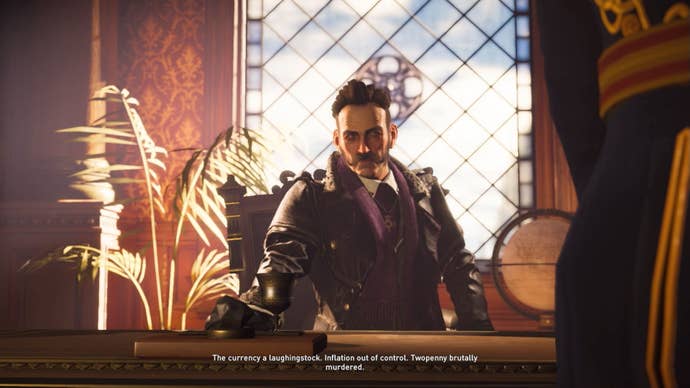
Case in point, alongside those stealth additions, the tools you're given in this game can completely trivialize certain encounters. The throwing knife kills most enemies in a single headshot. If you take your time and you're stocked with knives, you can clear out enemy dens rather quickly. Trapped in a mass of enemies? The new Voltaic Bomb will help you out of that jam just as well as the standby Smoke Bomb can. Perhaps you should use the hallucination dart to make those guards kill each other? Ubisoft has additional challenges in each mission and attempting to fulfill those is where the challenge in the game really comes from at times.
Once you move away from the hard stealth idea, then you can appreciate Assassin's Creed for what it is. It's a playground. That's why Syndicate is at its best when it gives you an objective and lets you go wild. The Assassination missions are the heights of this, featuring a variety of entry points, opportunities for stealth and special kills, and more freedom in how you achieve your objective. I found the same was true of the missions you do for Jacob and Evie's associates. Whether it's diving into a factory to free children or simply killing a Templar lackey, the regular open world missions are a lot more fun once you have all your toys.
Mechanical Engineering
Syndicate will probably get hit for having the same core game that every Assassin's Creed has since ACII, but you have to acknowledge Ubisoft's continuing experiments. The major experiment here is the carriage, which I'm ultimately mixed on. As a tool to get from point A to point B, carriages are great. If a mission is more than 500 meters away, I usually steal a carriage to get there. It's much faster than waiting for fast travel. (I'm not sure if you can call it "fast travel" if it takes 45+ seconds to load.)
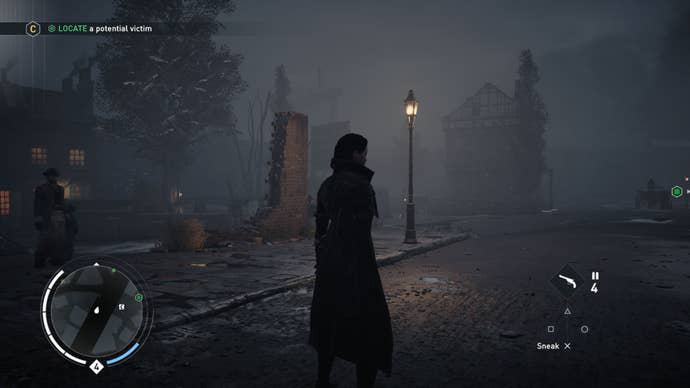
But like Batman: Arkham Knight, when you're forced to use carriages in an action sequence, things start to break down a bit. They're large, unwieldy things, so if you're looking for the precision of a driving game, you're out of luck. You can also leap from carriage to carriage for hijacking purposes, which works well at lower speeds, but in the midst of a speedy chase, you'll end up bouncing off the cobblestones more often than not. I like carriages, but more as a movement tool than as a part of story sequences.
I have similar feelings about the new rope launcher. For ziplining from point-to-point or scaling building it's absolutely flippin' amazing. The rope launcher is something the series has needed and I'm glad it's here finally. Doing an air assassination from a zipline feels badass and using the rope launcher to make a quick exit out of a bad situation is cool.
The problem is the rope launcher isn't as comprehensive as I'd like. For one, it doesn't track to every corner and surface like the grapple gun in Batman: Arkham Knight does. Instead, it picks certain attach points from your specific vantage point and you just have to work with what it gives you. As a tool for stealth, it'd be much better with pinpoint accuracy. Also, the rope launcher needs further integration with the parkour mechanics. You can only rope launcher while standing, not hanging off anything and it's not always a smooth transition from parkour movement to rope launcher. I love the tool, but implementaiton could be a bit better.

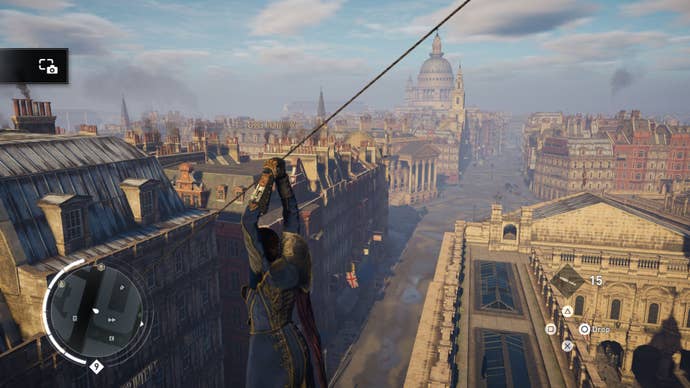
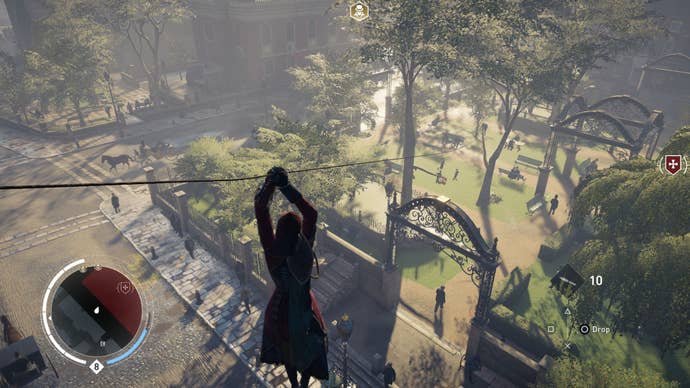

Finally, there's the new kidnapping mechanic, which is a rather big part of the story missions, so I'm surprised Ubisoft hasn't talked about it more. The idea is that you can come up behind certain targets and bring them until your forceful control. Kidnapping flags you as the same faction as your target, so other enemies won't give you the side-eye while you're doing it. There's a bubble around you that expands when you either move faster or stop moving completely. Enemies inside that bubble will see through your charade, so the trick is to move slow enough to keep the bubble as small as possible. It's a cool mechanic that you'll probably have to get used to, especially if you intend to do Bounty Hunt missions.
What to Do, What to Do
Assassin's Creed Syndicate is still an open-world game, meaning there's still mission potpurri. The in-game map isn't as crowded as it was in Unity. In fact, the mission associates system means the game slowly ramps up the number of missions available on your map instead of throwing everything at you.
The associates (Heny Green Clara, and Inspector Abberline) offer the missions that let you take back the city: Bounty Hunts, Templar Hunts, Gang Strongholds, and Child Liberations. On top of that are Memories, finite mission chains involving historical figures like Charles Darwin, Alexander Graham Bell, Charles Dickens, and Karl Marx. Then there's Robert Topping's side stuff, including Fight Clubs and Carriage Races. Oh, and don't forget about Ned Wynert's carriage and ship hijacking, which pop up on the map at random. And in the midst of all that you can collect bottles, illustrations, pressed flowers, helix bits, and music boxes to unlock other special items.
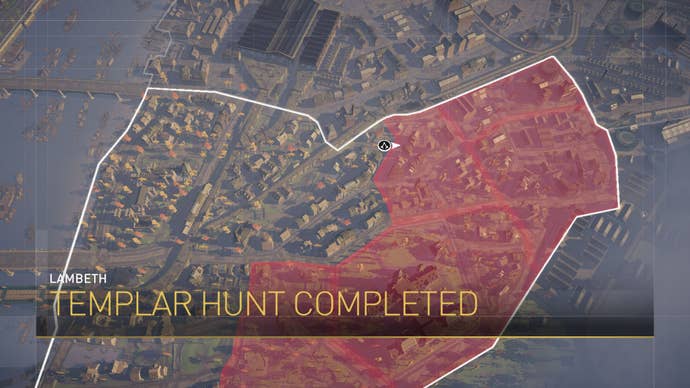
Yeah, there's a lot to do. I personally finished all the story missions, every associate mission, and all the memories. Even though I'm repeating some of the same basic concepts, those concepts are played out in different environments and I'm moving towards an overall goal. For me, open-world games are a zen experience. If that all sounds overwhelming though, you really don't need to do all of it. I've long stopped doing most of the item collections in Assassin's Creed games and I'm not worse for wear. You can choose what you want to do and leave the rest behind. That's the strength of open-world games.
The Era Continues On
That's a lot of words about what Assassin's Creed Syndicate is, but how do I feel about it? Good! Unlike many, I actually enjoyed Unity and Syndicate is the better game. I'm not tired of the core that makes up Assassin's Creed. For me, the strength is playing around in a new era, a new place. If there's one thing Ubisoft is great at in these games, it's anchoring you into the semi-simulation they've created. The chosen place and era is half the fun.
I wasn't previously excited to romp around London, but it grew on me. The buildings are taller than any other game in the series, monuments of stone and metal. Coal smoke dots the landscape and at night, the gaslight lamps cast a soft glow. Some nights, the fog is deep, with other characters passing in an out of your vision like ghosts. Each district feels different once you know what to look for: the abject poverty of Whitechapel, the sprawling upper middle class estates of the The Strand, the Thames already muddied and ruined due to industry. The signs, painted and lit up, are everywhere, selling ales and tonics. And the pubs!
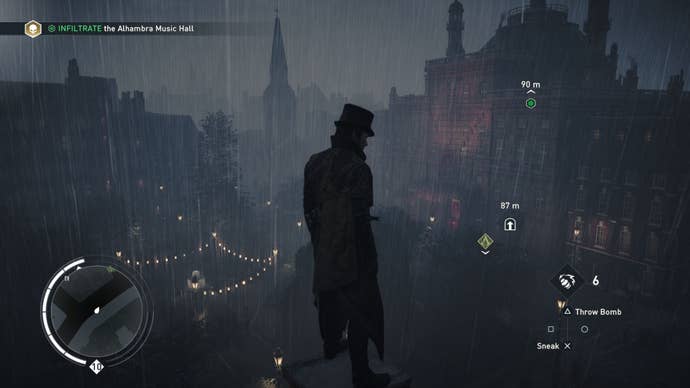
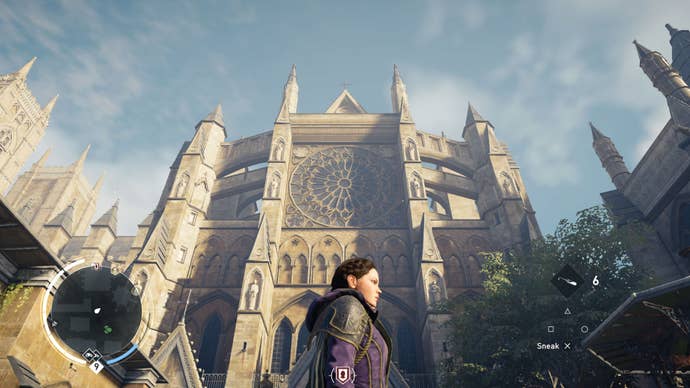
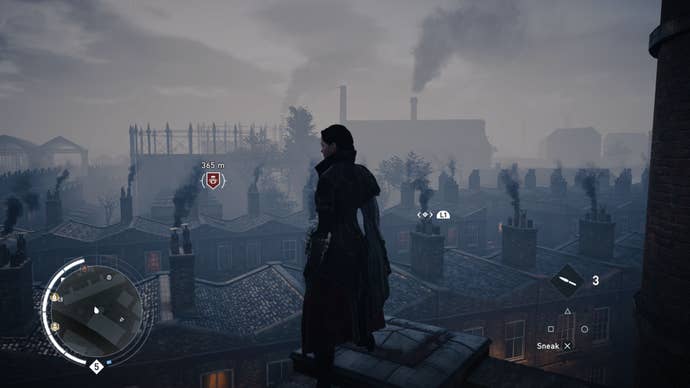
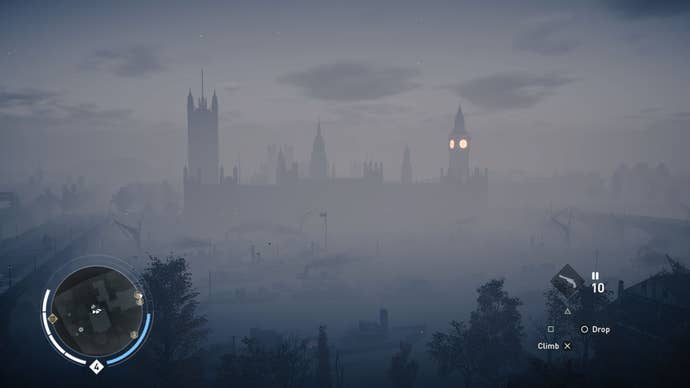
I liked London despite myself. I like it more than I liked Paris.
I enjoyed Evie more than than I liked Arno. I love seeing an Assassin's Creed protagonist who has actually bought into the whole Brotherhood thing. That's something we haven't had since Ezio. We honestly should have more of it; the roguish hero is great, but we don't need to keep mining the same ground Ubisoft. Not everyone has to be Han Solo.
Is Syndicate Assassin's Creed II to Unity's Assassin's Creed, as I hoped? No, but it's a firm move in the correct direction. I feel like we're a step towards the mountaintop. Assassin's Creed II and AC: Black Flag came together wonderfully and I feel like the new beginning that Ubisoft kicked off with Unity is still waiting for that perfect configuration. A few cuts, some expansion here and there; I feel Ubisoft can get there. Until then, Assassin's Creed Syndicate is worth your time and your money.
InterfaceSome may hate the stealth ring, but I like it. It lets me know if I'm hidden or not. Information is important in a stealth game.
Lasting AppealThere's no multiplayer, so once you've collected everything, that's it.
SoundWhoever wrote the soundtrack deserves a commendation. There's some great jaunty tunes here.
VisualsSyndicate is no slouch, but I feel that Ubisoft aimed for performance over fidelity.
ConclusionWhile Syndicate isn't AC II, to Unity's AC, it's still an improvement over Ubisoft's 2014 offering. The pair of protagonists work well, some stealth options return, and there's more ways to get around. London is a worthy playground for the Frye twins... and for players.

